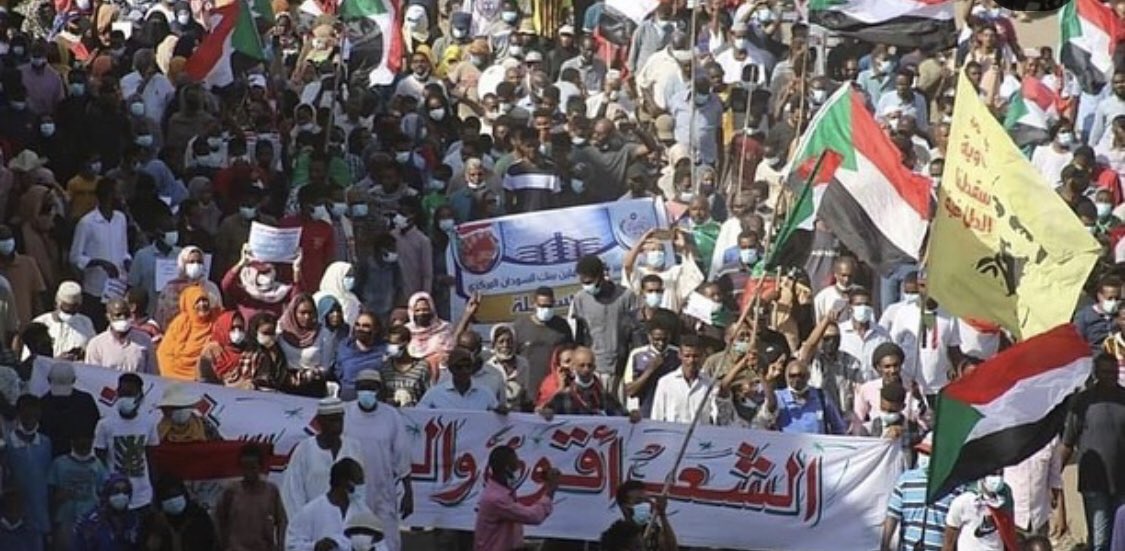
Sudan’s ousted Prime Minister Abdalla Hamdok, who had been placed under house arrest with last month’s military coup, appeared on TV Nov. 21 to sign a new power-sharing agreement with putsch leader Gen. Abdel Fattah al-Burhan. But the deal officially restoring Hamdok as prime minister was immediately rejected by the pro-democracy movement in the streets. Just after the announcement, security forces in Khartoum fired tear-gas at protesters marching toward the presidential palace to demand the military’s complete withdrawal from politics. “The future of the country will be determined by the young people on the ground,” said Siddiq Abu-Fawwaz of the Forces for Freedom & Change coalition.
Military toops shot dead at least 15 people on Nov. 17 in the bloodiest confrontation yet with pro-democracy activists demonstrating against the October coup. The grassroots neighborhood-based Resistance Committees nonetheless vowed to continue the protests. “The day’s massacre reinforces our slogans: no negotiations, no partnership, no compromise,” said a statement from the Sudanese Professionals Association, another pillar of the pro-democracy coalition.
Demonstrations have centered on Khartoum, but protests also broke out last week in the eastern city of Port Sudan. At least 40 people have been killed since al-Burhan dissolved the military-civilian power-sharing transitional government. The widening crackdown has drawn international condemnation; the UN High Commissioner for Human Rights described the use of live ammunition by the security forces as “utterly shameful.” The EU said perpetrators “will be held accountable.”
Al-Burhan appointed a new ruling council last week, but struggled to fill seats in a new cabinet—exposing the difficulty the military faces in finding civilian governing partners. UN special envoy to Sudan Volker Perthes has called for “a new technocratic cabinet.” (BBC News, Sudan Tribune, The New Humanitarian)
Photo via Twitter





Repression at anti-coup protest in Khartoum
Hundreds of thousands of people marched to the presidential palace in Sudan’s capital Khartoum Dec. 19 to reject the October military takeover, drawing volleys of tear gas and stun grenades from security forces. At least one death is reported. The Central Committee of Sudanese Doctors says 45 people have been killed in crackdowns on protesters since the coup. (Al Jazeera, Al Arabiya)
UN calls for inquiry into Sudan security force sexual assaults
The UN Human Rights Office said that it has received allegations of security forces raping or gang-raping 13 women and girls during the protests in Khartoum on Dec. 19. Liz Throssell, spokesperson for the UN High Commission for Human Rights, called for a “prompt, independent and thorough” investigation into the allegations. (Jurist)
More deadly repression in Sudan
Sudanese security forces shot and killed four protesters in the city of Omdurman, as tens of thousands of demonstrators across the country continued to rally against military rule, in defiance of a security lockdown. (MEE)
More deadly repression in Sudan
Security forces killed two people during protests in Sudan on Jan. 2 against military rule. This brought to 56 the death toll in protests since the October coup, the Central Committee of Sudanese Doctors said. Both men were killed in the city of Omdurman. (Reuters)
Sudan: repression continues as PM steps down
Sudanese security forces fired bullets and tear-gas to break up dozens of anti-coup demonstrations in the capital Khartoum and other cities Jan. 4. Prime Minister Abdalla Hamdok resigned two days earlier, citing the failure of repeated mediation attempts with the military and its newly appointed “Sovereignty Council.” (Sudan Tribune, Sudan Tribune, Jurist, NYT)
More deadly repression in Sudan
Sudanese security forces killed seven protesters in fresh anti-coup demonstrations on Jan. 17 triggering calls for mass civilian disobedience nearly three months after the military takeover. The new casualties bring to 71 the death toll of protesters killed after the coup of October 2021. (Sudan Tribune)
Sudan: women march against coup regime
Sudan saw country-wide demonstrations on March 15 to protest the alleged gang-rape of a young woman by the security forces. The woman had been travelling in a public bus in Khartoum that was stopped and tear-gassed by the police. Pro-democracy demonstrators, many of them young women, marched towards the presidential palace carrying signs reading “We will not be broken.” (TNH)
Mass detention, ‘disappearance’ in Sudan
Security forces have detained hundreds of anti-government protesters and “disappeared” scores more, Human Rights Watch said in a new report April 28. Prisoners have been beaten, child detainees stripped naked, and women threatened with sexual violence. Families of the detained have appealed to the military-led government for their release, saying the arrests violate international human rights law. (TNH)
Deadly repression in Sudan on uprising anniversary
Seven people were killed in Sudan—five in Omdurman and two in Khartoum—as huge crowds took to the streets to commemorate the 2019 uprising against the military regime. Security forces used tear-gas and opened fire on demonstrators. (Al Jazeera, Reuters)
Sudan: deadly repression on coup anniversary
At least one protester was killed in Sudan, run over by a security forces vehicle in Omdurman, as pro-democracy demonstrators marked the first anniversary of a coup that derailed a transition to civilian rule. Security forces “No partnership, no negotiation with the putschists,” protesters chanted, in what has become a pro-democracy rallying cry. (France24)